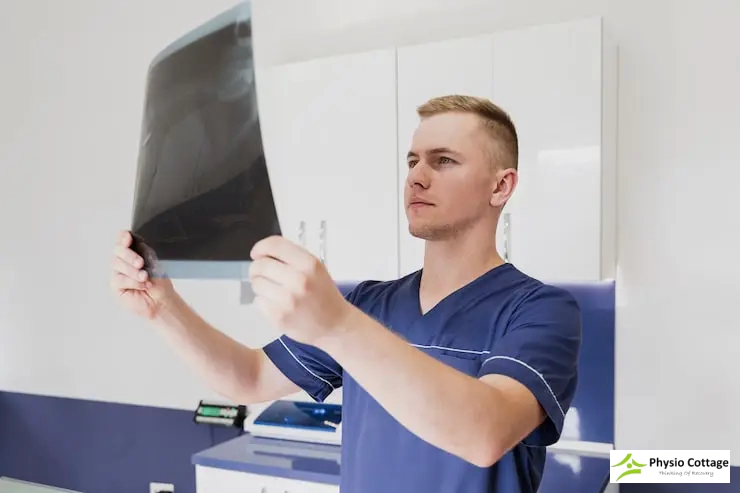Pregnant and struggling with morning sickness or aching joints? Acupuncture, a cornerstone of Traditional Chinese Medicine (TCM), is gaining traction among expectant mothers for its ability to ease discomfort and promote wellness. In Canada, many pregnant women turn to complementary therapies like acupuncture to manage symptoms naturally. If you’re in Scarborough and searching for a physiotherapist near me in Scarborough, Physio Cottage offers safe, prenatal-focused acupuncture. This comprehensive guide explores the safety, benefits, and practical steps for using acupuncture during pregnancy, highlighting why Physio Cottage is a trusted choice. Keep reading to discover how acupuncture can enhance your pregnancy journey and support a healthier, more comfortable experience.
What Is Acupuncture?
Acupuncture is an ancient practice rooted in Traditional Chinese Medicine (TCM) that has been used for thousands of years. It involves inserting thin, sterile needles into specific points on the body to stimulate energy flow, or “qi” (pronounced “chee”). The aim is to restore balance and encourage the body’s natural healing processes. While the thought of needles might sound daunting, most people find acupuncture minimally invasive and even relaxing. During pregnancy, acupuncture can target specific symptoms and provide tailored support for expectant mothers.
How Acupuncture Is Adapted for Pregnancy
Pregnancy requires special precautions, as certain acupuncture points can influence uterine activity. Practitioners avoid “forbidden points” (e.g., on the abdomen, lower back, or specific areas like SP6 or LI4) that may stimulate contractions, especially in early pregnancy. Instead, they target points that promote relaxation, pain relief, and overall wellness. For example, the PC6 point on the wrist is commonly used to reduce nausea, while points on the legs may ease lower back pain. Scarborough clinics with prenatal expertise ensure treatments align with your pregnancy stage, prioritizing safety for both mother and baby.
Scientific Evidence Supporting Acupuncture
Research supports acupuncture’s effectiveness for pregnancy-related symptoms. Studies show it reduces nausea by up to 75% in the first trimester and alleviates lower back and pelvic pain in 60–70% of cases. Additional trials suggest acupuncture improves sleep quality, reduces stress, and may shorten labor duration when used in the third trimester. While more research is needed to fully understand its mechanisms, healthcare providers increasingly recognize acupuncture as a safe complementary therapy when performed by qualified professionals. This growing acceptance makes it a valuable option for Scarborough residents seeking natural relief.
Benefits of Acupuncture During Pregnancy
Acupuncture offers a holistic approach to managing the physical, emotional, and preparatory challenges of pregnancy. Below, we explore its key benefits, tailored to the needs of expectant mothers in Scarborough:
1. Easing Morning Sickness and Nausea
Morning sickness affects up to 80% of pregnant women, often disrupting daily life in the first trimester. Acupuncture targets points like PC6 (inner wrist) to reduce nausea and vomiting. Many patients report significant relief after 2–3 sessions, improving appetite and energy levels. This allows expectant mothers to maintain nutrition and enjoy daily activities with less discomfort.
2. Relieving Pain and Discomfort
Pregnancy-related pain, such as lower back pain, pelvic discomfort, or sciatica, often results from weight gain, postural changes, or hormonal shifts. Acupuncture reduces inflammation, relaxes tight muscles, and improves blood flow. For example, points on the lower legs can ease sciatica, while upper back points target shoulder stiffness. By combining acupuncture with gentle manual therapy, Scarborough practitioners help you stay active and comfortable without relying on medications.
3. Improving Sleep Quality
Insomnia and sleep disturbances affect 60% of pregnant women, driven by physical discomfort or anxiety. Acupuncture lowers stress hormones like cortisol, promoting deeper, more restful sleep. Sessions targeting relaxation points, such as those on the head or ears, help you fall asleep faster and wake up refreshed. Better sleep supports overall health, making it easier to manage pregnancy’s demands.
4. Reducing Stress and Anxiety
Prenatal anxiety and mood swings, experienced by 10–20% of women, can stem from hormonal changes or concerns about childbirth. Acupuncture stimulates endorphin release, fostering emotional balance and calm. Regular sessions can reduce stress, helping you feel more grounded and confident. Scarborough clinics create soothing environments to enhance this calming effect, supporting mental well-being throughout pregnancy.
5. Preparing for Labor and Delivery
In the third trimester, acupuncture can promote cervical ripening, encourage optimal fetal positioning (e.g., correcting breech presentation), and prepare the body for labor. Pre-birth acupuncture, typically started at 36 weeks, may reduce labor duration and the need for medical interventions. Scarborough practitioners use specific points to support a smoother delivery, benefiting mothers aiming for a natural birth experience.
6. Managing Additional Pregnancy Symptoms
Acupuncture addresses a range of symptoms, including:
Headaches: Targeting points on the head and neck to reduce tension.
Heartburn: Stimulating digestive points to alleviate discomfort.
Swelling (Edema): Improving circulation to reduce fluid retention in legs or ankles.
Fatigue: Boosting energy through points that enhance vitality.
This comprehensive approach ensures expectant mothers receive tailored relief for their unique symptoms.
7. Supporting Postpartum Recovery
Postpartum acupuncture aids recovery by addressing pain, fatigue, and emotional challenges. It can alleviate breastfeeding discomfort, reduce pelvic or back pain, and support mood stability, helping with postpartum depression or anxiety. Scarborough clinics offer postpartum sessions to ease the transition into motherhood, promoting physical and emotional healing.
8. Enhancing Overall Wellness
Beyond symptom relief, acupuncture improves general well-being by boosting energy, supporting immune function, and promoting balance. Regular sessions help expectant mothers feel more resilient, enhancing their pregnancy experience and preparing them for the demands of motherhood.
✔️ Also read: Can Acupuncture Help with Weight Loss?
Is Acupuncture Safe During Pregnancy?
When performed by a trained and certified professional, acupuncture is generally safe during pregnancy. However, it’s essential to consider certain factors to ensure the best outcomes for you and your baby:
- Avoid Certain Points: Specific acupuncture points, such as those around the abdomen and lower back, are traditionally avoided during pregnancy as they may stimulate uterine contractions. A skilled practitioner will know how to avoid these points.
- Licensed Practitioners Only: Always choose a licensed acupuncturist with experience in prenatal care. They will have the expertise needed to tailor treatments to your unique needs.
- Discuss Your Medical History: Be transparent with your acupuncturist about your medical history, pregnancy stage, and any complications you may have.
What to Expect During an Acupuncture Session
If you’re new to acupuncture, it’s natural to have questions about what a session involves. Here’s a step-by-step overview:
- Initial Consultation: Your acupuncturist will begin by discussing your health, pregnancy symptoms, and goals for treatment. This helps them create a personalized plan.
- Preparation: You’ll lie down in a comfortable position, usually on your side or back. The practitioner will sterilize the areas where needles will be inserted.
- Needle Insertion: Thin needles are gently inserted into specific points on your body. You might feel a slight pinch, but the process is generally painless.
- Relaxation Time: The needles are left in place for 15-30 minutes while you relax. Many people find this part deeply calming.
- Post-Session Feelings: After the session, you might feel relaxed and rejuvenated. Some individuals notice immediate relief from symptoms, while others may need multiple sessions for the full effect.
Choosing the Right Acupuncturist
The safety and effectiveness of acupuncture during pregnancy largely depend on the practitioner. Here are some tips for finding the right professional:
- Check Credentials: Ensure the acupuncturist is licensed and certified by a reputable organization, such as the National Certification Commission for Acupuncture and Oriental Medicine (NCCAOM) in the United States.
- Ask About Experience: Choose someone with specific experience in prenatal acupuncture. This ensures they understand the unique needs of pregnant individuals.
- Seek Recommendations: Ask your healthcare provider, friends, or family for referrals to trusted acupuncturists.
When to Avoid Acupuncture During Pregnancy?
While acupuncture is generally safe, there are certain situations where it might not be the best option:
- High-Risk Pregnancy: If you have a high-risk pregnancy, consult your healthcare provider before trying acupuncture. They can advise whether it’s safe for your specific circumstances.
- Untrained Practitioners: Never work with an unlicensed or inexperienced acupuncturist. This can increase the risk of complications.
- Adverse Reactions: If you experience unusual symptoms like severe cramping, dizziness, or bleeding after a session, stop treatment and consult your healthcare provider immediately.
Scientific Evidence Supporting Acupuncture in Pregnancy
Research has shown that acupuncture can be an effective tool for managing pregnancy-related symptoms. Studies indicate that it’s particularly useful for alleviating nausea, reducing pain, and improving overall well-being. While more research is needed to fully understand its effects, many healthcare providers now recognize acupuncture as a complementary therapy during pregnancy.
Consult Your Healthcare Provider First
Before beginning acupuncture, always consult your healthcare provider. They can help determine whether it’s a safe and appropriate option based on your medical history, pregnancy stage, and overall health.
Sum up
Acupuncture is a safe, natural, and effective way to manage many pregnancy-related symptoms, from morning sickness to back pain. When performed by a qualified professional, it can enhance your pregnancy experience by promoting relaxation, relieving discomfort, and preparing your body for labor.
If you’re considering acupuncture during pregnancy, take the time to research practitioners, discuss your options with your healthcare provider, and ensure you’re in good hands. By prioritizing safety and care, you can enjoy the benefits of acupuncture and support your journey to motherhood. For expert acupuncture in Scarborough, call us at Physio Cottage and let us support your pregnancy journey with personalized care.
FAQs About Acupuncture During Pregnancy in Scarborough
Here are answers to common questions, incorporating terms like physical therapy Scarborough and Scarborough physiotherapy clinics:
Is Acupuncture Safe in the First Trimester?
Yes, when performed by a trained practitioner, acupuncture is safe in the first trimester, focusing on nausea and fatigue relief. Scarborough clinics use prenatal-safe points to ensure no risk to the pregnancy.
How Many Sessions Are Needed for Results?
The number of sessions varies by symptom. Nausea may improve in 2–4 sessions, while pain relief might require 6–8. Scarborough practitioners tailor plans to your specific needs and progress.
Can Acupuncture Induce Labor?
Only specific points, used intentionally in the third trimester, may encourage labor. Scarborough clinics avoid these points unless preparing for delivery, ensuring safety throughout pregnancy.
Is Acupuncture Covered by Insurance?
Many Ontario insurance plans cover acupuncture, though coverage varies. Check with your provider and confirm with your Scarborough clinic for billing details.
What Should I Feel During a Session?
You may feel a slight pinch during needle insertion, followed by relaxation or warmth. Scarborough clinics ensure comfort, with many patients finding sessions calming or even nap-inducing.
How Does Acupuncture Help Postpartum?
Postpartum acupuncture reduces pain, boosts energy, and supports emotional health. Scarborough clinics offer tailored sessions to address breastfeeding issues or postpartum depression.
Can Acupuncture Help with Breech Babies?
Yes, acupuncture combined with moxibustion (a heat therapy) can encourage breech babies to turn, often used around 34–36 weeks. Scarborough practitioners with prenatal expertise offer this service safely.









